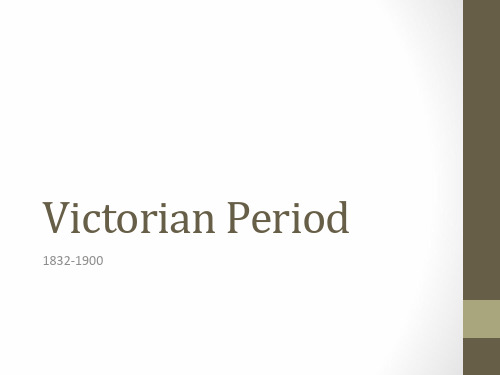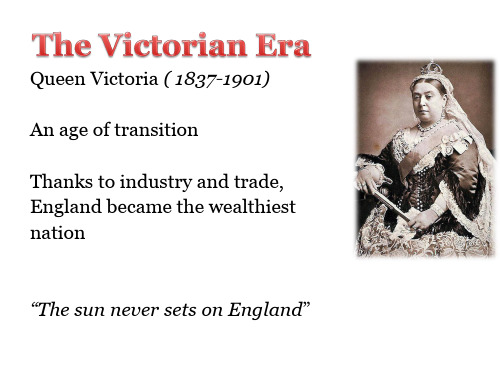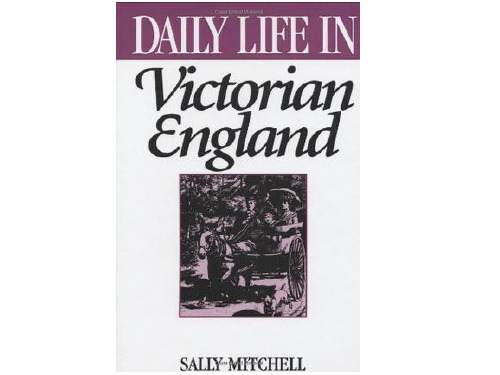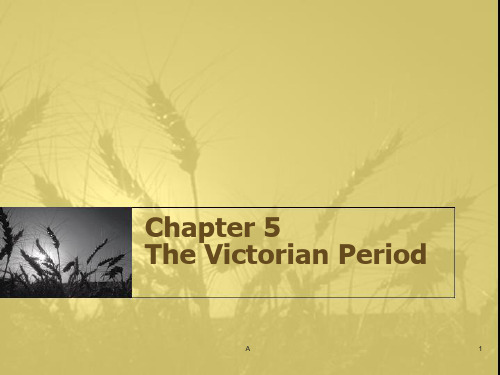维多利亚时代的英国【英文】
合集下载
维多利亚时代【英文】 victorian period

Victorian Period
• Women for suffrage – did not succeed until 1918 (30 & over) • Universal adult suffrage 1928 extended vote to women at age 21 • Factory Acts – limited child & women labor • State supported schools est. in 1870; compulsory in 1880; free in 1891 • Literacy rate increased from 40% to 90% from 1840-1900.
• First Reform Bill in 1832 extended vote to all men who owned property worth 10 lbs • Second Reform Act in 1867 gave the right to vote to working-class men (except agricod
• Intellectual Progress
• Understanding of earth, its creatures & natural laws (geology, Darwin – theory of evolution) • Industrialization of England depended on and supported science and technology.
Victorian Period
• Paradox of progress
• Victorian – synonym for prude; extreme repression; even furniture legs had to be concealed under heavy cloth not to be “suggestive”
维多利亚时代TheVictorianAge

Factory Children
• Mill owners said that they had to keep their prices down. That was why workers' hours had to be long, and wages low. Women and children got lower wages than men, so the owners employed a lot of women and children.
• • Children as young as six or seven worked up to fourteen hours a day in the mills. Their pay
was about three shillings (15p) a week. Many were killed or injured by the moving parts of the machines they had to clean. Others were maimed by a foreman's fist or strap. Sadly, many of them were forced to work by their own parents. Their fathers were out of work, and the family needed the few shillings that they could earn. • • Some decent employers paid their workers a fair wage. Some even built good houses for them, and ran schools for their children. Some mill-owners took part in a movement for factory reform. Most mill-owners were against the reformers, though. They said that shorter hours for children would put up their costs, and bring them to ruin. • • Mill-owners did not obey Parliament's first acts cutting mill hours. But an act passed in 1833 said that inspectors would enforce the law. The act banned all children under nine from cotton mills. Children over nine were allowed to work, but there were strict controls on their hours. By 1847, ten hours per day was the limit for boys and all female workers.
Victorian Era 维多利亚时代

TYPICAL INCOMES (YEARLY)
Aristocrats £30,000 Merchants, bankers £10,000 Middle-class (doctors, lawyers, clerks) £300-800 Lower middle-class (head teachers, journalists, shopkeepers, etc.) £150-300 Skilled workers (carpenters, typesetters,etc.) £75100 Sailors and domestic staff £40-75 Laborers, soldiers £25
19TH CENTURY ENGLAND
THE INDUSTRIAL REVOLUTION
It accelerated the migration of the population from country to overcrowded c 1876 the telephone was invented by Alexander Graham Bell The radio was invented in 1895 by Guglielmo Marconi. The camera, toilet, sewing machine, vacuum, train and stamp were all created during the Victorian Era. Factories began to be powered by steam. The police force was created during this period.
Great Expectations
维多利亚时代【英文】

Children and crime: Many destitute children lived by stealing and they were seen as threats to society. Something had to be done about them to preserve law and order.
• The housing shortage: Workers wanted to live nearby their working places because it was time-saving. As a result of these demands and overcrowded conditions, the housing became scarce and expensive; therefore, so many people preferred slum-housing.
• Prostitution:Beginning in the late 1840s, major
Queen Victoria ( 1837-1901)
An age of transition Thanks to industry and trade, England became the wealthiest nation
“The sun never sets on England”
• Britain was unchallenged military power • Britain dominated Global trade and expanded as a colonial empire in India, Australia, Africa and Brazil
维多利亚时代英文介绍

After Albert died she wore black for the rest of her life.
In 1863 John Brown saved Victoria when she was involved in two carriage accidents. They became good friends, and she was so upset when he died in 1883 that she never rode a horse again.
Victoria fell in love with a man called Albert, who was German. She proposed to him in 1840 and they were married soon after.
Victoria and Albert had nine children. Victoria loved having photographs and paintings done of her with Albert and their children. Let’s look at some of them.
The was born in 1882. She had eleven brothers and sisters. When she was young she was never left alone as her mother feared she might be murdered by one of her uncles.
Queen Victoria died in 1901, when she was 83. She was buried in a white dress and her wedding veil. London was decorated in white and purple for the occasion.
维多利亚时代简介(权威英文版)

Victorian Drama
The theater was a flourishing and popular institution during the Victorian period. The popularity of theater influenced other genres. Bernard Shaw and Oscar Wilde transformed British theater with their comic masterpieces.
Charles Darwin(达尔文)
Charles Dickens
(1812-1870)
Charles Dickens
Pickwick Papers (1836-7) 《匹克威克外传》 Oliver Twist (1837-1838)《奥利佛.退斯特》 The Old Curiosity Shop (1841) 《老古玩店》 Dombey and Son:(1846_48) 《董贝父子》 David Copperfield: (1849-50)《大卫*科波菲尔》 Bleak House (1854) 《荒凉山庄》 Hard Times (1854)《艰难时世》 Little Dorrit (1855-57)《小杜丽》 A Tale Of Two Cities (1859) 《双城记》 Great Expectations (1860_61) 《远大前程》
English Literature in the Victorian Period
Queen Victoria
English Literature in the Victorian Period
Victorian England(维多利亚时代的英国)

The Definition of Victorian England
• This refers to the period between 1837 • and 1901 when Queen Victoria ruled Britain . • The term "Victorian" is often associated with the style of bulidings and furniture of the period,but more importantly with the strict moral attitude toward sex that many people had or pretended to have.
• Major Themes • Background
《米德尔马契》
• 《米德尔马契》,是英国女作家乔治· 艾略特的第七部长篇小
说。该书于1862年开始动笔,但不久由于Thornton Lewes的患病而 搁置。次年艾略特重新开始写作,并把一些分散的情节结合成一个整 体,1871-1872年完成。单卷本于1874年出版,销量颇为理想。 • 小说的题目米德尔马契是作者虚构的英国省城。省城附近的庄园住着 布鲁克先生的侄女西莉亚和多萝西亚。多萝西亚希望找到学者型丈夫, 于是不顾众人反对,和比她年长27岁的牧师卡苏朋订了婚,并预见卡 苏朋的侄儿威尔· 拉迪斯拉夫。与此同时,27岁的利德盖特来到米德 尔马契,创立新医院,倡导医疗改革。改革触动了当地医生的利益, 利德盖特被迫娶了米德尔马契市长之女罗莎蒙德为妻,被她套取大量 钱财。 • 婚后的多萝西亚十分孤独,威尔与她谈得投机,爱上了她,结果被卡 苏朋禁止踏入家门。布鲁克要参加选举,要拉威尔办报造势。詹姆士 爵士同西莉亚结婚生子。后卡苏朋突然逝世,威尔留在米德尔马契。 最后多萝西亚放弃财产与威尔结合,利德盖特则因无法实现抱负,50 岁去世。
• This refers to the period between 1837 • and 1901 when Queen Victoria ruled Britain . • The term "Victorian" is often associated with the style of bulidings and furniture of the period,but more importantly with the strict moral attitude toward sex that many people had or pretended to have.
• Major Themes • Background
《米德尔马契》
• 《米德尔马契》,是英国女作家乔治· 艾略特的第七部长篇小
说。该书于1862年开始动笔,但不久由于Thornton Lewes的患病而 搁置。次年艾略特重新开始写作,并把一些分散的情节结合成一个整 体,1871-1872年完成。单卷本于1874年出版,销量颇为理想。 • 小说的题目米德尔马契是作者虚构的英国省城。省城附近的庄园住着 布鲁克先生的侄女西莉亚和多萝西亚。多萝西亚希望找到学者型丈夫, 于是不顾众人反对,和比她年长27岁的牧师卡苏朋订了婚,并预见卡 苏朋的侄儿威尔· 拉迪斯拉夫。与此同时,27岁的利德盖特来到米德 尔马契,创立新医院,倡导医疗改革。改革触动了当地医生的利益, 利德盖特被迫娶了米德尔马契市长之女罗莎蒙德为妻,被她套取大量 钱财。 • 婚后的多萝西亚十分孤独,威尔与她谈得投机,爱上了她,结果被卡 苏朋禁止踏入家门。布鲁克要参加选举,要拉威尔办报造势。詹姆士 爵士同西莉亚结婚生子。后卡苏朋突然逝世,威尔留在米德尔马契。 最后多萝西亚放弃财产与威尔结合,利德盖特则因无法实现抱负,50 岁去世。
The Victorian Period 英国文学·维多利亚时代

The critical realists were unable to find a good solution to the social contradictions. The chief tendency in their works is not of revolution but of reformism.
→Common sense and moral propriety (得体) became the predominant
concern in literary works.
A
6
Changes in Ideology
• Religious collision • The widespread of Utilitarianism(功利主义)
A
15
Poetry
• Famous poets:
Robert Browning Alfred Tennyson Dante Gabriel Rossetti Gerald Manley Hopkins Algernon Charles Swinburne
A
16
The poetry of this period was mainly characterized by experiments with new styles and new ways of expression.
→With Industrial Revolution in full swing, England accumulated large amounts of profit and settled down to a time of prosperity and relative stability.
- 1、下载文档前请自行甄别文档内容的完整性,平台不提供额外的编辑、内容补充、找答案等附加服务。
- 2、"仅部分预览"的文档,不可在线预览部分如存在完整性等问题,可反馈申请退款(可完整预览的文档不适用该条件!)。
- 3、如文档侵犯您的权益,请联系客服反馈,我们会尽快为您处理(人工客服工作时间:9:00-18:30)。
Victorian England 1832-
1901
Named after Queen Victoria
When 18 year old Princess Victoria became Queen in 1837 no one dreamed she would reign for the rest of the century for another 64 years.
• Lives of millions were changed as suddenly the masses were able to travel further than ten miles in one direction.
The Rich Class
• enjoyed entertaining in their lavishly decorated homes – They associated clutter of ornamentation and showy display with wealth and so crammed their homes with furniture, knick knacks and pianos.
Working Conditions
• Millions of workers lived in slums or in vacated old decaying upper class houses. The occupants of slums had no sanitation, no water supply, no paved streets, no schools, no law or order, no decent food or clothing.
Hale Waihona Puke The Railway – A symbol of
Progress
• The railways moved goods, foods and people faster than canals or horse drawn wagons.
• The greatest factor in transforming Britain into an industrial nation.
Victorian Prosperity
• Country becomes Urban (cities) • Elite enjoy the development of new machinery
and new work methods. • Poor are the underpaid workforce consisting of
The Poor Class
• In a poor family—all worked—parents and children. Their were no child labor laws.
• Very few poor children were allowed an education as this would interfere with their labor time.
• Many now had to walk miles to factories to work beginning at 5.30.a.m—never less than ten. The brutal degrading conditions were so awful that drunkenness and opium taking was common as homelife had so little to offer
Society and Social Class
• In church the higher classes sat at the front in reserved pews and lower classes at the back.
• The wives of wealthy industrialists were clothed in prominent finery as they were the social representatives of their husbands.
adults and children living in wretched poverty. • By 1850 half the country's former peasants were
squashed into Britain's cities. The growth of industry, the building boom, the swift population spurt and spread of the railway changed the character of Britain too rapidly for many to understand.
• A new social class emerged: the middle class. An outward display of wealth through clothing and possessions .
Work houses and Poor Law
• The Poor Law Amendment abolished systems of poor relief that had previously existed, replaced by workhouses.
• The treatment in a workhouse was little different from that in a prison leaving many inmates feeling that they were being punished for the crime of poverty.
1901
Named after Queen Victoria
When 18 year old Princess Victoria became Queen in 1837 no one dreamed she would reign for the rest of the century for another 64 years.
• Lives of millions were changed as suddenly the masses were able to travel further than ten miles in one direction.
The Rich Class
• enjoyed entertaining in their lavishly decorated homes – They associated clutter of ornamentation and showy display with wealth and so crammed their homes with furniture, knick knacks and pianos.
Working Conditions
• Millions of workers lived in slums or in vacated old decaying upper class houses. The occupants of slums had no sanitation, no water supply, no paved streets, no schools, no law or order, no decent food or clothing.
Hale Waihona Puke The Railway – A symbol of
Progress
• The railways moved goods, foods and people faster than canals or horse drawn wagons.
• The greatest factor in transforming Britain into an industrial nation.
Victorian Prosperity
• Country becomes Urban (cities) • Elite enjoy the development of new machinery
and new work methods. • Poor are the underpaid workforce consisting of
The Poor Class
• In a poor family—all worked—parents and children. Their were no child labor laws.
• Very few poor children were allowed an education as this would interfere with their labor time.
• Many now had to walk miles to factories to work beginning at 5.30.a.m—never less than ten. The brutal degrading conditions were so awful that drunkenness and opium taking was common as homelife had so little to offer
Society and Social Class
• In church the higher classes sat at the front in reserved pews and lower classes at the back.
• The wives of wealthy industrialists were clothed in prominent finery as they were the social representatives of their husbands.
adults and children living in wretched poverty. • By 1850 half the country's former peasants were
squashed into Britain's cities. The growth of industry, the building boom, the swift population spurt and spread of the railway changed the character of Britain too rapidly for many to understand.
• A new social class emerged: the middle class. An outward display of wealth through clothing and possessions .
Work houses and Poor Law
• The Poor Law Amendment abolished systems of poor relief that had previously existed, replaced by workhouses.
• The treatment in a workhouse was little different from that in a prison leaving many inmates feeling that they were being punished for the crime of poverty.
